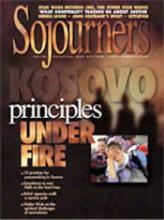Some of us devote our workday lives to community activism or political involvement. But the rest of us often feel ambivalent about how few of our commitments and relationships directly foster social justice. How do we share food and company with neighbors whose political commitments trouble us deeply? May we cultivate disciplines like music and scholarship without explicitly relating them to injustice?
So long as exploitation and violence are pervasive (and often invisible) practices, it can seem myopic to cultivate our talents, nurture our families, or even spend time with our neighbors. Such actions can seem complicit in a refusal to see and engage the demonic powers in the world. It's not surprising, then, that many of us feel restless when we are writing or baking or doing whatever we most love instead of attending a political meetingyet also feel restless when we contribute our time to political involvement instead of cultivating our talents or our intimate relationships.
This persistent restlessness is not a new experience. Sixteen hundred years ago, the Christian monks of the Egyptian desert noticed a similar phenomenon. When they were at work, they felt drawn to prayer; when they prayed, they felt drawn to work; when they settled in one monastery, they became convinced that true spirituality could be found only in the monastery down the road. Because such feelings struck hardest in the middle of the day, monks associated them with the "noonday demon" in Psalm 91. The monk's task was not to flee from this demon, but to stay put and wrestle with it.
Read the Full Article
